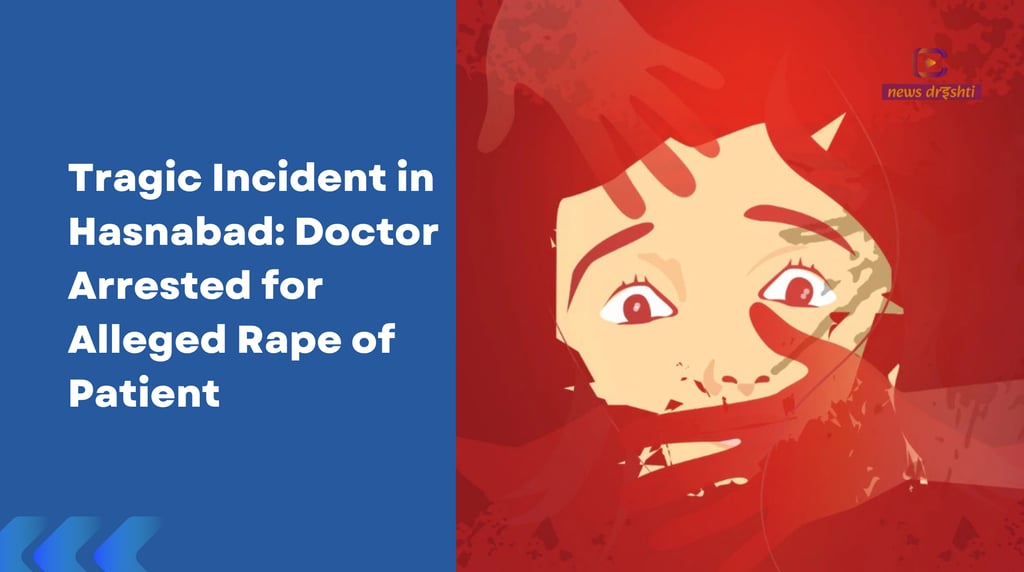Tragic Incident in Hasnabad: Doctor Arrested for Alleged Rape of Patient
In Hasnabad, a doctor’s arrest following allegations of assault has sparked urgent discussions on medical ethics and patient trust. The incident highlights critical gaps in patient safety and underscores the importance of support resources for survivors, including counseling, legal aid, and medical care as they seek justice and recovery.
COMMUNITY


Overview of the Incident
On a fateful day in early October 2023, a grave incident unfolded in Hasnabad, leading to the arrest of a local doctor, Nur Alam Sardar. The situation began when a 26-year-old female patient visited the doctor's clinic for a medical consultation. As she sought medical attention, it is alleged that the doctor exploited his position of trust and authority, leading to a horrific act of violence against her. Following this traumatic event, the victim displayed remarkable courage by promptly reporting the incident to the authorities, initiating a necessary investigation.
The victim's decision to come forward became crucial in shining a light on the alleged misconduct. Within days of the incident, community members were alerted to the serious allegations against Sardar, resulting in widespread discussions regarding safety in medical facilities. The outrage from the public prompted local law enforcement to take immediate action. They conducted a thorough investigation, which included interviewing the victim and gathering evidence at the clinic where the incident allegedly occurred. This rapid response was vital in ensuring that justice could be sought and upheld for the victim.
The allegations against Nur Alam Sardar not only sparked significant concern among residents but also highlighted potential systemic issues regarding patient safety and the ethical responsibilities of healthcare professionals. As details of the incident emerged, both local authorities and advocacy groups aimed to address the grave implications for women's rights and medical ethics. The community collectively awaited the next steps in the legal process, reflecting a growing demand for accountability and transparency within the healthcare system.
The Role of Medical Ethics and Patient Trust
The doctor-patient relationship is fundamentally built on trust, with patients relying on medical professionals for guidance, support, and treatment during vulnerable times. Medical ethics play a crucial role in nurturing this trust, as they entail the moral principles that guide medical practice. Physicians are expected to adhere to the standards of beneficence, non-maleficence, autonomy, and justice, ensuring that patient welfare remains at the forefront of their practice. When a doctor violates these ethical boundaries, as alleged in the tragic incident in Hasnabad, the ramifications can be profound and far-reaching.
The erosion of trust in the healthcare system is one of the most significant consequences of ethical breaches. Patients often approach medical professionals with an implicit understanding that they will be treated with respect, dignity, and confidentiality. However, when that trust is betrayed, it can lead to a loss of faith not only in the individual practitioner but in the healthcare system as a whole. This incident serves as a stark reminder that any violation can instill fear among patients, potentially discouraging them from seeking necessary medical assistance. Such hesitation can have detrimental effects on their overall health and well-being.
Medical professionals hold immense responsibilities, including being stewards of the trust placed in them by society. They are expected to prioritize the wellbeing of their patients while maintaining a safe and respectful environment. In light of the recent allegations, it becomes imperative that the healthcare community reflect on the standards upheld within their practices. As we consider the dynamics of responsibility and expectation in the doctor-patient relationship, it is clear that breaches of medical ethics can lead not only to individual suffering but also to broader implications for public confidence in medical institutions.
Legal Proceedings and Investigative Steps
The recent incident in Hasnabad, involving a doctor accused of rape, has prompted immediate legal actions and thorough investigative measures. Upon the filing of the First Information Report (FIR) by the victim and her husband, the police commenced their investigation promptly. One of the earliest steps was the recording of the survivor's statement, which is critical in such sensitive cases as it provides the initial account of the alleged offense. This statement is not only vital for understanding the context of the incident but also plays a significant role in gathering supporting evidence.
Following the victim's account, law enforcement moved swiftly to apprehend the accused physician. His arrest was facilitated by the collection of evidence, which may include medical reports, witness statements, and any relevant surveillance footage that could substantiate the claims made by the victim. The police are obligated to follow due legal process in gathering evidence, ensuring that both the rights of the accused and the victim are upheld throughout the investigation.
As the case progresses, it will be subjected to the judicial process, where both parties will have the opportunity to present their arguments. The prosecution is expected to provide substantial evidence to support the claims of assault, while the defense will seek to challenge the credibility of the evidence and possibly the character of the allegations. The outcome of this case could significantly impact the lives of both the victim and the accused, setting a precedent for how similar cases are handled in the future. In light of the severity of the allegations, the court's decisions will likely reflect a commitment to justice while ensuring that the implications of such a serious charge are comprehensively examined.
Support for Survivors of Sexual Assault
Survivors of sexual assault often face an overwhelming array of challenges on their path to recovery. It is crucial that they are aware of the resources available to them in order to navigate the emotional, legal, and medical aspects of their trauma. Various organizations and services specialize in providing comprehensive support tailored to the needs of survivors.
One of the primary resources available is counseling services. Licensed therapists and counselors trained in trauma-informed care can help survivors process their experiences and work towards healing. Organizations such as RAINN (Rape, Abuse & Incest National Network) offer free confidential support through their hotline, providing an accessible option for those seeking guidance. Local shelters and community-based organizations also often provide counseling services, creating a safe space for survivors to share their stories.
Legal assistance represents another vital area of support. It is essential that survivors understand their rights and options when it comes to pursuing justice. Many legal advocacy organizations specialize in assisting survivors with legal proceedings, offering services such as advice, representation, and support during the reporting process. Engaging with an attorney knowledgeable about sexual assault cases can help individuals navigate the complex legal landscape while ensuring their voices are heard.
Furthermore, medical care is a critical component of an effective response to sexual assault. Healthcare providers trained in this area can offer necessary medical examinations, screening for sexually transmitted infections, and emergency contraception. Local hospitals often have specially trained personnel equipped to provide compassionate care for survivors. Familiarizing oneself with available medical resources can significantly alleviate the fears and uncertainties that accompany a survivor's experience.
In conclusion, offering support to survivors of sexual assault is imperative. Access to counseling, legal assistance, and medical care empowers survivors to reclaim their narratives and seek the justice they deserve. By raising awareness of these resources, society can play a crucial role in assisting survivors in their journey toward recovery and healing.
